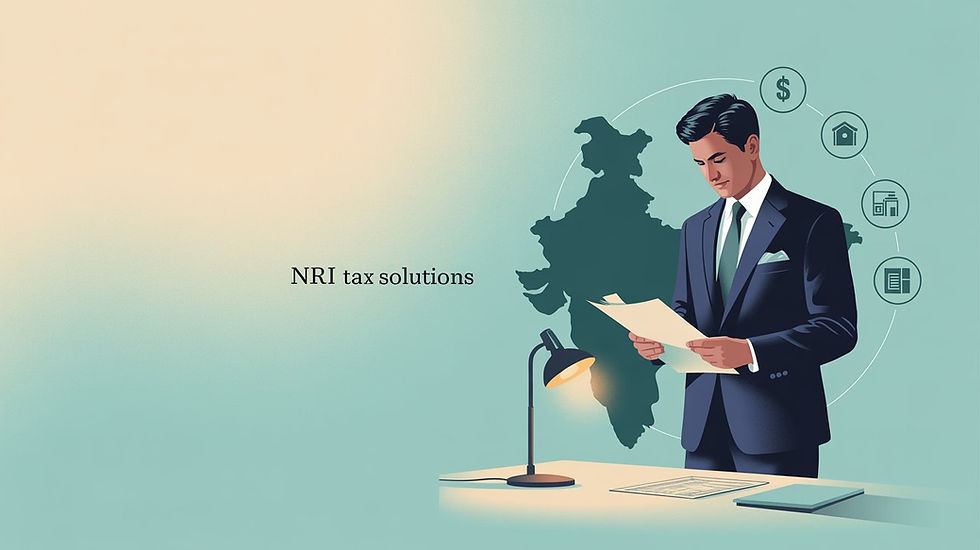Can You Inherit Your Parents' Debt in India?
- Content Turtle
- Jan 5, 2024
- 3 min read
Updated: May 22, 2025
If a parent passes away with unpaid loans, do their children become legally responsible for it?
It’s a question many Indians ask, often in moments of grief, confusion, or sudden financial pressure.
Whether it’s a home loan, credit card dues, or personal debt, the fear of “inheriting liability” is real. And with more families taking on EMIs than ever, understanding the legal and financial implications is not just important — it’s urgent. In this blog, we break down what the law actually says about inheriting debt in India and what happens to a borrower’s obligations after death.

Understanding Debt Inheritance:
Contrary to popular belief, inheriting debts from parents is not an automatic process. The responsibility for repaying a deceased individual's debts primarily rests with the deceased person's estate. The estate comprises all the assets and liabilities left behind, and it is the executor's or administrator's duty to settle these matters.
Key Points to Consider:
1. Estate Settlement:
(a) When a person passes away, their estate, including assets and debts, becomes a legal entity.
(b) The executor (if named in a will) or administrator (appointed by the court in case of intestacy) is responsible for settling the deceased's estate.
2. Liabilities Settled from Estate:
(a) Debts are typically settled from the deceased's estate before distributing the remaining assets to the heirs.
(b) If the estate has insufficient assets to cover the debts, the creditors may have a claim on the assets, but the heirs are generally not personally liable.
3. Joint Liability:
(a) In cases where a debt has joint borrowers or guarantors, the surviving joint borrowers or guarantors may become solely responsible for the outstanding amount.
4. Nomination and Survivorship:
(a) In financial instruments like insurance policies, provident funds, and bank accounts, the concept of nomination and survivorship comes into play.
(b) If a nominee is named or if there is a survivorship clause, the proceeds go directly to the nominee or survivor, bypassing the probate process and any claims from creditors.
5. Separation of Personal and Business Debts:
(a) It's crucial to distinguish between personal debts and business debts, especially for individuals involved in business or entrepreneurship.
(b) Business debts may be treated differently, and the legal structure of the business plays a key role in determining liability.
6. Probate Process:
(a) If a will exists, it needs to go through the probate process to validate its authenticity.
(b) During probate, creditors are given an opportunity to make claims against the deceased person's estate.
7. Statute of Limitations:
(a) In India, there is a statute of limitations on the collection of debts. Creditors must initiate legal proceedings within a specified period; otherwise, the debts may become time-barred.
8. Educating Heirs:
(a) It is essential for individuals to educate their heirs about their financial situation, including debts, to avoid confusion and legal complications after their demise.
Conclusion:
In conclusion, inheriting parents' debts in India is a nuanced process that involves the settlement of the deceased person's estate. The legal framework is designed to protect heirs from shouldering the burden of debts directly. However, understanding the specifics of the deceased's financial situation, the nature of debts, and the legal processes involved is crucial.
To navigate these complexities, seeking legal advice and engaging in transparent communication about financial matters within the family is highly recommended. Knowledge empowers individuals to make informed decisions and ensures a smoother transition of assets and liabilities within the family. Remember, while debts may be a part of one's financial legacy, the responsibility for repayment is intricately tied to the estate left behind.
Managing money can be overwhelming! Whether you're tackling financial challenges or striving to achieve life goals, consulting a reliable financial advisor is a wise move. For expert guidance and effective personal finance management, talk to Turtle today -
1. Just head to our website — Link here
2. Click on “Book a free call”
3. Choose the date & time as per your convenience and RELAX!
Turtle Advisors will take it from there!


